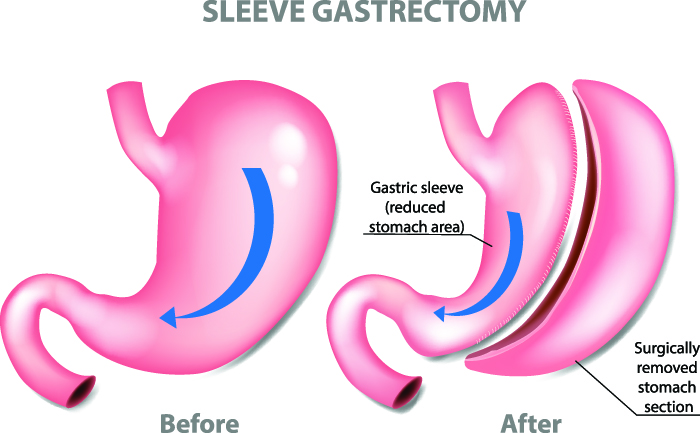Sleeve Gastrectomy Procedure in Kondapur, Hyderabad
Also known as vertical sleeve gastrectomy, sleeve gastrectomy is a surgical procedure for weight loss wherein 75 to 80 per cent of the stomach is removed.
What is Sleeve Gastrectomy?
Usually done laparoscopically, sleeve gastrectomy is a minimally invasive bariatric procedure, wherein the surgeon makes small cuts in the upper abdomen and inserts tiny instruments through them.

Why is Sleeve Gastrectomy Done?
The purpose of a sleeve gastrectomy is to help you lose weight and minimize your chance of developing serious weight-related medical conditions including high blood pressure, obstructive sleep apnea, stroke, infertility, heart disease, high cholesterol, type 2 diabetes, and cancer.
It is usually performed as a last resort when a person has tried to lose excess weight by exercising regularly and having a healthy, well-balanced diet but failed to do so. Generally, it is an option for individuals with a BMI of 40 or above or with a BMI between 35 and 39.9 and a serious health condition such as sleep apnea, diabetes, or high blood pressure.
How is Sleeve Gastrectomy Done?
Sleeve gastrectomy is a minimally invasive procedure, i.e. it is performed using a device called a laparoscope. In this device, a camera is attached which is connected to a monitor. First, the patient is given general anaesthesia. The surgeon first makes between two and four incisions in the abdomen. Through these incisions, the laparoscope and other special instruments are inserted. The surgeon can examine inside the abdomen through the camera as the video captured by it is projected on the monitor.
To expand the stomach, a non-toxic gas is pushed into it. This provides more space for the surgeon to work. After this, the stomach is divided into two parts and around 80 per cent of it is removed. The remaining 20% portion is then sutured together at the margins. This results in a stomach that is about 25% of its actual size, giving it the shape of a banana. The sphincter muscles aren’t cut or changed during the surgery. Then, all the tools and the laparoscope is removed and the incisions are stitched.
What Happens After Sleeve Gastrectomy?
After sleeve gastrectomy, you would be brought to a recovery room where you’ll be kept under observation for an hour or two. You would experience pain for which your doctor at Apollo Kondapur will prescribe medication. Most patients can go home within 2 to 3 days of their surgery unless any complications arise. Since the surgery is done laparoscopically, the incisions are small. Hence, they heal quickly. After your surgery, you would have to drink clear liquids on the day of it. Within the next 2 to 3 days, you can shift to pureed foods. Your doctor will recommend a specialized diet for you.
What are the Complications Associated with Sleeve Gastrectomy?
Certain complications that may arise after sleeve gastrectomy include;
- Infection at the incision site
- Blood clots
- Leakage from incision
- Excessive bleeding
- Allergic reaction to anaesthesia
- Breathing problems
- Hernias
- Hypoglycemia
- Vomiting
- Blockage of the gastrointestinal tract
- Gastroesophageal reflux
- Malnutrition
Request an appointment at Apollo Spectra Hospitals, Kondapur
Call 1860-500-2244 to book an appointment
In most cases, patients go on to lose weight for about two to three years, post their sleeve gastrectomy. With this surgery, many other health conditions such as high blood pressure, obstructive sleep apnea, asthma, GERD, high cholesterol, and type 2 diabetes also improve in patients. It also makes it easier for patients to perform daily activities and move about. However, for the changes to remain permanent, patients need to put in their efforts such as exercising regularly and maintaining a healthy, well-balanced diet.
Before your surgery, your doctor will ask you to get certain tests and checkups such as a total physical exam, blood tests, and preparatory classes for training yourself on what to do after your surgery. You should avoid or quit smoking a few weeks before surgery as it slows down the healing process. You should also inform your surgeon about all the medications you are taking and if you are pregnant. You may be asked to stop certain medications such as blood thinners. You will also be advised about when to stop drinking and eating before your surgery.
Sleeve gastrectomy surgery lasts 1 to 1.5 hours.
A tiny pouch is created and connected to the small intestine in gastric bypass surgery, whereas in sleeve gastrectomy, a part of the stomach is removed.
Symptoms
Our Top Specialities
NOTICE BOARD
CONTACT US
CONTACT US
 Book Appointment
Book Appointment


.svg)
.svg)
.svg)
.svg)








